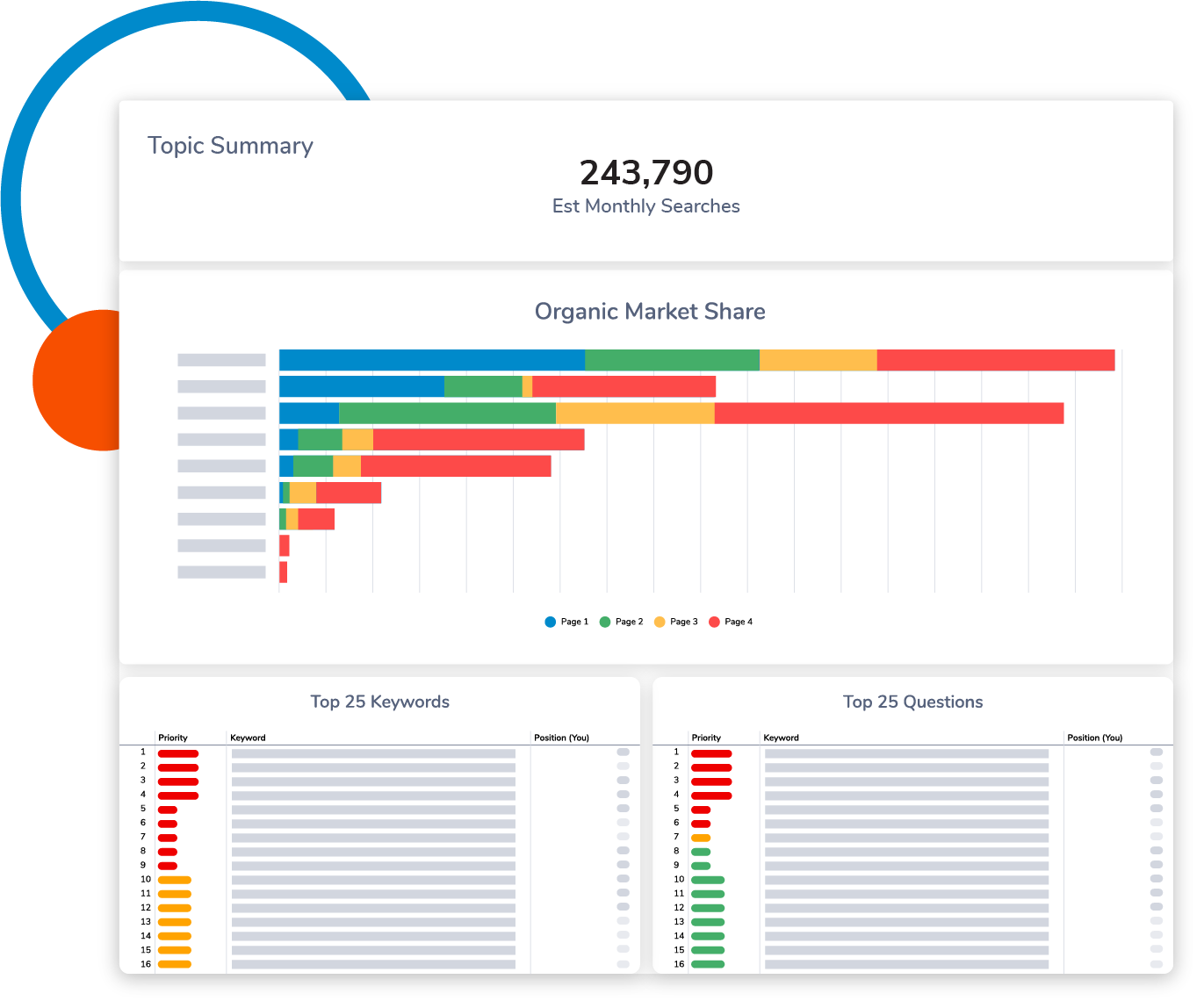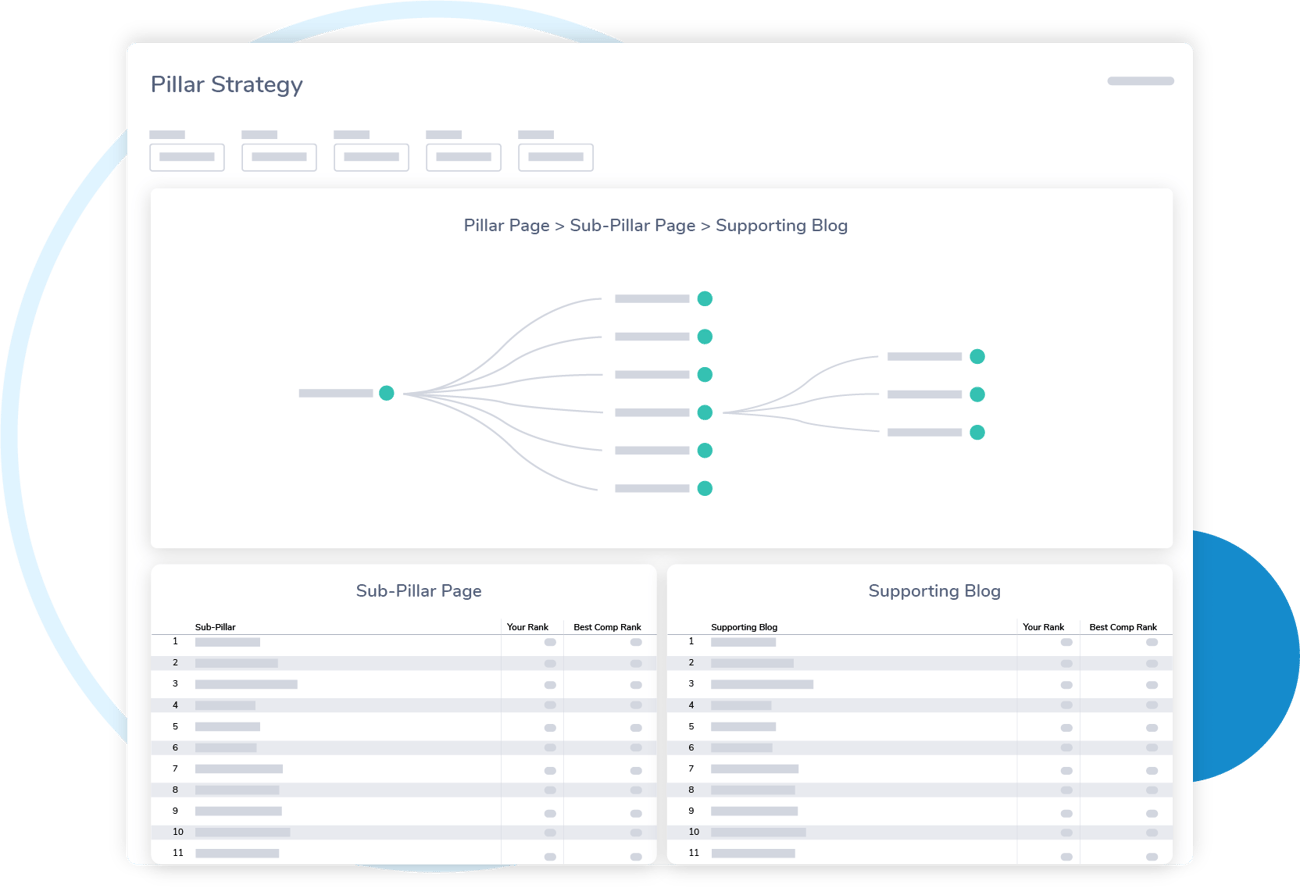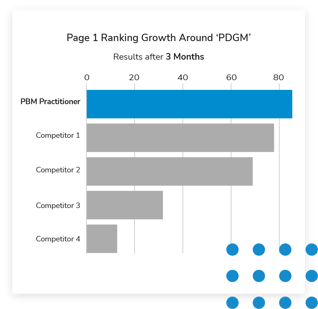About 75% of users never scroll past the first page of Google and other common search engines. That’s probably not a surprise, given that more than 25% of users click on the very first organic search result in Google.
Most marketers agree that organic search is one of the top ways to increase website traffic—and it’s free, as an added bonus!
So if you’re one of the thousands of companies that aren’t on the first page of Google, you’re missing out on huge amounts of traffic (and the potential revenue that comes with it).
Fortunately, there’s a proven process to boost your SEO rankings: keyword research.
Having a deeper understanding of SEO keyword research will result in increased knowledge about your target audience, their inquiries and needs, and how to capture their attention. Putting this knowledge to use can help improve your SEO rankings and achieve more hits to your website.
This blog will explore what keyword research is, why it’s important, and top keyword research tips that can help you take your SEO-driven content to the next level.
What is Keyword Research in SEO?
Keyword research is the process of researching terms and questions that people type into search engines, and then using that information to build or expand an SEO-driven content marketing plan for your website.
In other words, using the right keywords can boost your SEO rankings, which is one of the major ways to increase organic traffic to your website.
But, what is SEO? If search engine optimization (SEO) is the process of improving website rankings on search engines, keyword research is the first step in getting you there. So if you came here wondering “how do you do keyword research fast,” you might initially be disappointed to find out that it is a process that takes time (although there are a lot of great keyword research tools to help it go quicker). But, you’ll be happy to know it’s a process that will pay off in the end.

What is the Importance of Keyword Research in SEO?
Keyword research helps businesses in many different ways, including:
- Understanding your audience: Knowing who your audience is, what their concerns or pain points are, and what kinds of content they’re looking for can help as you develop a content marketing plan to drive more traffic to your site. Understanding their goals and interests can help you not only choose the right SEO keywords but also create the right kinds of content.
- Identifying common questions about your product or service: Do you know what your customers are asking for? How about what questions they have about your field in general? Keyword research can help you establish a baseline knowledge about the commonly-asked inquiries in your industry. Hint: these might be inquiries your sales or customer success teams face on a regular basis, so they can help develop educational marketing materials.
- Learning more about your competitors: If one of your competitors is ranking for a keyword in your field—either by paid or organic efforts—you should be too. Doing keyword research can help you understand their marketing efforts, and where your work can have the most impact.
- Driving website traffic: Of course, one of your ultimate goals may be to drive more traffic to your website. Website traffic can easily convert to leads or sales—meaning more revenue for your business. What’s more, website traffic is a commonly-used KPI for digital marketers, so increases here will certainly help your numbers as well.
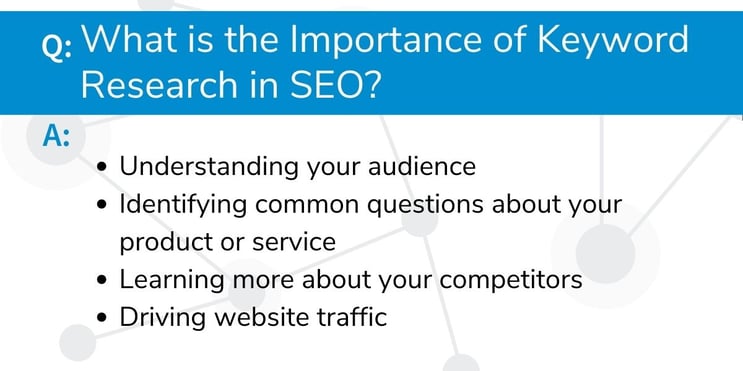
How to Choose Keywords for SEO: A 3-Step Process
If you’re wondering how to do keyword research, you’re not alone. There are so many different tools and strategies that it can be hard to discern what should be included in keyword research. Here are some common keyword research steps to get you started.
Step 1: Analyze existing keywords or make a list of starter keywords.
If you already have keywords, you can use them as a jumping-off point for your research. If you don’t, start making a list of keywords and phrases that are related to your business.
For example, if your business provides accounting and HR services, your list might include “accounting,” “human resources,” “bookkeeping,” and “HR.”
Step 2: Find related keywords.
The next step is to expand upon that list. This can be done in several ways. The quickest—and easiest—is by using a keyword research tool like DemandJump that will automate the process for you.

You could also use free keyword research tools like Google Planner or Answer the Public that’ll do the basics for you—but may require you to do a lot of the legwork yourself. It’s also possible to do manual keyword research by using Google and their Google Related Searches feature that appears at the bottom of the page.
No matter which way you choose, the goal is to come up with a lengthy list of keywords and phrases.
Step 3: Narrow down your list.
It’s not possible to rank for every keyword—at least not right away, for every piece of content. So start choosing which keywords you want to rank for first.
For example, these might be location-specific terms to better reach your clientele or big picture keywords like “outsourced accounting.” To better narrow down your list, use data. Keyword research tools can provide you with insight into the level of competition you have for these specific keywords.
And, you should of course analyze your own ability to produce content using the keywords you want to use.
Take a listen to DemandJump's "Page One Or Bust" podcast to hear why choosing the correct topic to write about is so important. Check out a clip below:
10 Keyword Research Tips Proven to Drive SEO Results
Now that you understand the basics of keyword research, let’s review some quick keyword tips to help your research process be as useful as possible.
Understand Search Intent
An important part of keyword research is understanding the keywords you come across in the context they were meant to be in. For example, if you find the keyword “bread,” users might be looking for bread recipes, the best brands of bread to buy, bread makers, or even recipes that use bread as an ingredient.
While these all might sound fairly related, if you’re a bread maker manufacturer, you want to use the keywords that capture the bread-making crowd, not those just looking for the right loaf to purchase from a store. This can be fairly complex, but having an understanding of your audience and buyer personas is a good place to start.
Find a Mix of Short-Tail And Long-Tail Keywords
Short-tail keywords are those keywords that are around one to three words in length. Think “bread,” “deep dish pizza,” and “cat adoption.” Long-tail keywords are phrases and questions that are a bit longer, generally around four to ten words. Because they’re longer keywords, they’re often more specific...which means it’s easier to understand search intent and to rank for them since there are likely fewer competitors.
Examples of long-tail keywords are “how do I make gluten-free bread,” “best pizza in Indianapolis,” or “what do I need to adopt a cat.”
Know Your Competitors
Keyword research tools such as DemandJump make it possible to compare how you’re doing compared to your competitors for the keywords you’re hoping to rank for. This can not only give you a wealth of ideas for what keywords you should be using, but it can also provide a guidepost for measuring your SEO improvement over the long haul.

Are your SEO strategies improving your rankings compared to your competitors? You’re doing something right—and seeing the tangible results to prove it! Alternatively, if there are some keywords you’re ranking really high for, you can keep an eye on that content, updating and improving it occasionally to maintain your high ranking.
Analyze Your Content Gaps
Don’t have a powerful keyword research tool to sneak a peek at your competitors and compare your rankings to theirs? There’s a manual method too—analyzing content gaps.
Explore your own website and take notes on the content you have, its goals, and how well it's performing. Then, spend some time on your competitors’ websites and write down the types of content they have. Now compare your notes.
Are you missing relevant content on your site that your competitors have? If so, it’s time to find the right keywords and make a plan to create content on the topic for your site.
Don’t Ignore Onsite Searches
Your own website can be a wealth of information, too. Most websites today have an onsite search bar for users to type questions into and be directed to a page on the site. These searches are likely the same long- and short-tail keywords that actual users are looking for in search engines.
Take advantage of this opportunity for what it is: free keyword research. If many users are searching for the same word or phrase, it’s likely a signal that you should create some dedicated content that addresses that topic.
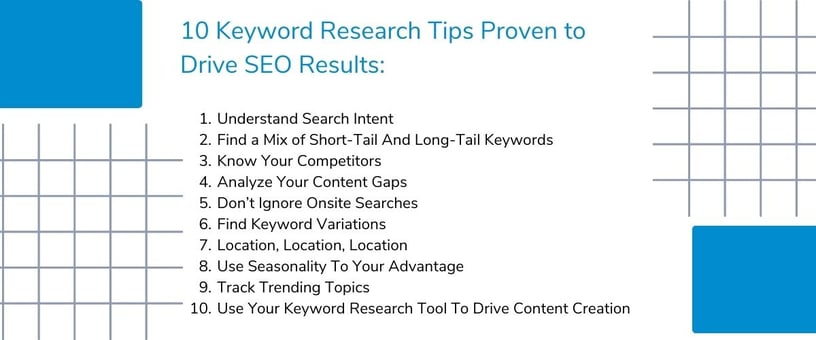
Find Keyword Variations
It’s not enough to just go for the basic or obvious keywords. To truly win the SEO game, you need to search for synonyms, variations, and topic-adjacent terms to capture an even bigger audience.
Keyword research tools like DemandJump can help by providing you with an outline of search terms based on a keyword or phrase. But it’s also possible to do this through manual keyword research.

Say you’re a bread maker manufacturer. You’re probably already keeping an eye on keywords like “bread maker” and “how to make bread.” But have you considered looking for “how to knead dough?” These variations are likely still relevant to your audiences but may be less obvious to your company at first.
Location, Location, Location
If you’re a local pizzeria, chances are you’re going to have a difficult time getting a first page ranking for “pizza” (though it’s certainly not impossible). Additionally, most people looking for dinner probably aren’t just searching for pizza. They’re likely searching for “pizza in Indianapolis” or “pizza downtown Indianapolis.” So if location applies at all to your company, use that to your advantage and search out keywords that target your specific clientele.
Use Seasonality To Your Advantage
Understanding when your target audience might be interested in a specific topic can help narrow down keywords—and design an SEO calendar that aligns with these times of the year. Here’s a keyword example most people are fairly familiar with: SEO keywords about TV sales skyrocket during the holiday shopping season.
But when are other times people might be searching for TVs? The week leading up to the Super Bowl, World Cup, or any other major sporting event is one example. Target the big, obvious seasons—but don’t forget about others.
Track Trending Topics
Products like Google Trends allow you to keep an eye on topics that are trending in the world—or even just in your region.
For example, when writing this article, “Eternals” and “Paw Patrol Movie” are both trending. What does this have to do with your SEO keyword research? It allows you to capitalize on trending topics. If you’re a children’s toy store, knowing that “Paw Patrol” is trending right now gives you an opportunity to create a blog about it and capitalize on the trend.
Use Your Keyword Research Tool To Drive Content Creation
This might be better labeled as the step after keyword research, but we think it’s important enough to mention here.
Keyword research tools like DemandJump do more than just make the research process easier—which is a huge help itself. But it also provides automated content outlines that give you recommended keywords, category groupings, and more. Essentially, it does all but writing the actual content for you, taking the guesswork out of the blank page.

Keyword Research is Better with DemandJump
Stop searching for “how to do keyword research for a blog or website” and get started with DemandJump. The platform automates keyword research - saving your team hours a day. It provides consumer behavior insights to help you find out which SEO keywords to use, how you’re ranking against your competitors, and a prioritized list of words to use based on your short- and long-term goals.
Bonus: With our one-click SEO content briefs, writing content has never been simpler. The briefs provide recommended H1s, H2s, which keywords to use in each section, and more—doing everything but writing the content for you.
If you’re ready to experience the difference DemandJump can make in your keyword research process, get started for free today!






